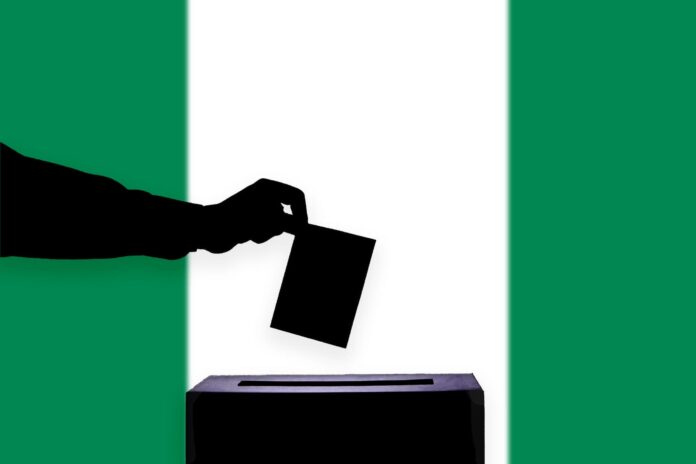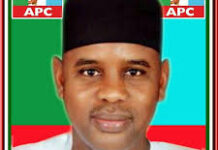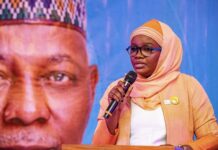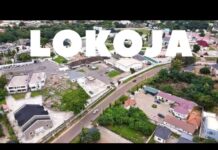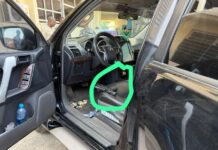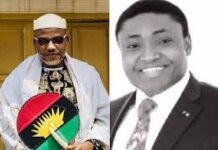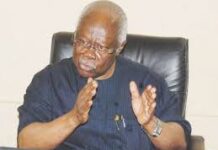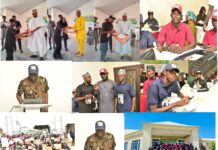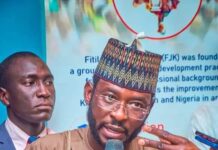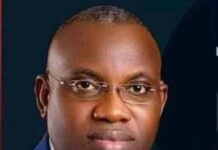INSECURITY: Will 2023 Polls Hold?
Clifford Ndujihe, Politics Editor
POLITICS DIGEST – GOING by the calendar of the Independent National Electoral Commission, INEC, the 2023 presidential election is exactly 671 days away.
On October 15, INEC National Chairman, Professor Mahmood Yakubu, announced February 18, 2023 as the date for the 2023 presidential contest.
He made the disclosure at the inauguration of the House of Representatives committee on 1999 constitution review.
Since the date was fixed the polity has been charged as hordes of presidential contenders and pretenders criss-cross the length and breadth of the country strategising, aligning and realigning. There have been posturing among the six geopolitical zones over which region should produce President Muhammadu Buhari’s successor. The two leading political parties-ruling All Progressives Congress, APC, and Peoples Democratic Party, PDP, are locked in efforts to ensure internal harmony, attract decampees from other parties, and be in a vantage position to reap electoral dividends in the next cycle of elections.
Amid these, there are fears that the election may not hold. Reasons: Increasing waves of insecurity and climate of violence, agitation for secession by some parts of the country, and insistence by many groups and leaders that the country must be restructured with fiscal and other powers devolved to the federating units before elections could be held
Besides, 2023 is the third year of a decade, which usually presents Nigeria with a bouquet of survival threatening challenges as have been witnessed in the last 70 years.
The jinx of third year of a decade
Since 1953, the country face major upheavals every other 10 years as observed in 1963, 1973,1983,1993, 2003, and 2013
1953 Kano riots
In May 1953, riots broke out in the ancient city of Kano, the largest city in Northern Nigeria. The riots, which lasted four days and claimed many lives, arose from clashes between northerners – generally opposed to Nigeria’s independence, and southerners – who supported immediate independence for Nigeria.
During pre-independence debates, Southern political leaders tried to press ahead with the independence drive, while their northern counterparts, who feared “domination by the south,” tried to slow the process.
On March 31, 1953, a prominent member of the Action Group, AG, Anthony Enahoro, moved the motion that Nigeria should become independent in 1956 at the federal parliament in Lagos. The motion got the backing of AG members and majority of the National Council of Nigeria and the Camerouns, NCNC, members.
However, the Northern People’s Congress, NPC, kicked against the motion for self-governance in 1956 because Northern politicians felt that their region was not yet ready.
Sir Ahmadu Bello, the NPC’s leader, proposed an amendment saying self- governance should be granted “as soon as practicable” instead of “in the year 1956” in Enahoro’s bill.
This led to disagreements and frosty relations between northern and southern leaders. A Northern member of the House moved a motion for adjournment, which the AG and NCNC members viewed as delay tactics, and walked out of the House.
On coming out of the House, the Northern delegates were confronted by hostile and jeering Lagos crowd. Embittered, members of the Northern delegation in an “Eight Point Programme” at Lugard Hall, Kaduna, sought for secession of the Northern Region from the Nigerian Union.
In the heat of the disquiet, a delegation of the AG and NCNC led by Samuel Akintola, went on tour of the North to campaign for self-government. The tour was the immediate cause of the Kano riots.
There was already tension in the region because of the hostility faced by the Northern delegation in Lagos who objected to self-governance when Akintola’s tour arrived Kano on Friday, May 15, 1953. According to reports, an initially orderly demonstration by NPC supporters took place that day, which was quickly followed by small skirmishes on Saturday, May 16. The disturbances that led to the riot started at the Colonial Hotel that Saturday. The hotel was the venue of a meeting by the AG. On the morning of the meeting, the Kano Native Authority withdrew permission for the meeting, and a mob gathered outside the hotel and started stoning people. During the fracas, two people believed to be Southerners died. The mob then moved on and attempted to gain entry into Sabon Gari but were subdued by the Native Authority police.
The situation became a more serious inter-ethnic crisis on Sunday, May 17, when mobs from Fagge, an area dominated by Northerners, attempted to break into Sabon Gari with some success.
Though the mobs’ original chants were against the Yoruba, the casualties in the Sabon Gari area were mostly Igbo, as the rioting soon deteriorated into looting. The skirmishes spilled into areas such as Fagge where ethnic clashes occurred. The Native Authority Police, and the Army, were called upon and prevented further degeneration.
On Monday, May 18, 1953, the colonial government declared a state of emergency in Northern Nigeria and troops were deployed to Kano.
No fewer than 46 people were killed during the riot, which was pronounced as an ethnic clash by the Colonial Government.
Indeed, the crisis aborted Nigeria’s independence in 1956 and delayed the momentous self-rule till October 1, 1960.
1962/63 census crisis
Nigeria conducted her first post-independence census in May 1962 via the Federal Census Office in the Ministry of Economic Development. The provisional figure of 45.1 million showed that the southern regions combined had a higher population than Northern Region. This was controversial particularly from political point of view and the exercise was cancelled, and a recount was ordered in 1963. Its management was also removed from the Federal Office of Statistics, marking the beginning of direct political interference in the process.
A special Census Board was set up, census staff numbers increased. At the end of the count, a population figure of 55.7 million was recorded, a difference of nearly 11 million.
This led to a slight redistribution of power in favour of Western Nigeria. Eastern Nigeria and the Mid-West lost five seats in parliament.
Read Also:
This reversal led to strident criticism of the 1963 results. Politico-ethnic rivalry brewed leading to two military coups in 1966 until it exploded in the civil war of 1967-70, which claimed no fewer than three millions lives and devastated much of today’s South-East and parts of South-South.
Also, the 1973 census returned a population of 79.8 million with the North making up 64.4 per cent. The exercise also flung Nigeria into another round of bitter controversy.
1983 military coup
Ten years after, Nigeria had its second general elections of the Second Republic. The elections were marred by violence in some states of the country.
Following the election held in August 1983, no fewer than 73 people died in outbreaks of violence mostly limited to two of Nigeria’s 19 states, Oyo and Ondo, in Western Nigeria. Both states were inhabited mainly by Yoruba and dominated by the Chief Obafemi Awolowo-led Unity Party of Nigeria, UPN
Results announced by the Federal Electoral Commission, FEDECO, showed that UPN candidates lost the governorships of both states to candidates from President Shehu Shagari’s National Party of Nigeria, NPN.
Then Oyo State Police Commissioner, Umaru Omolowo, reportedly said that 33 people had been killed in Oyo, 12 as the result of police efforts to quell disturbances. No fewer than 40 people were said to have been killed in Ondo, including two NPN legislative candidates who were reportedly set on fire by an angry mob.
Few months after the general elections, the military struck again. The Coup of December 31, 1983 was led by a group of senior army officers who overthrew the democratically elected government of President Shehu Shagari. Participants included Majors General Ibrahim Babangida and Muhammadu Buhari, Brigadiers Ibrahim Bako, Sani Abacha, and Tunde Idiagbon.
1993 June 12 election fiasco
A decade later, Nigeria faced one of the greatest threats to her corporate existence following the annulment of the June 12, 1993 presidential election. In the historic election, the Social Democratic Party, SDP, Muslim-Muslim ticket of MKO Abiola and Babagana Kingibe trounced the National Republican Convention, NRC, Muslim-Christian ticket of Bashir Tofa and Sylvester Ugoh.
Military President Babangida’s annulment of the election and Abiola’s’ presumed mandate midway into the announcement of the results by Professor Humphrey Nwosu, the chairman of the National Electoral Commission, NEC, pushed Nigeria to the brink.
There were series of protests by pro-democracy and human rights activists for the restoration of June 12. Many lives were lost to the struggle. Some were exterminated by agents of government. General Babangida stepped aside to handed over to an Interim National Government, ING, led by Chief Ernest Shonekan. The ING leader was toppled a few months later by General Sani Abacha, who later died in the process. Abiola also later died in detention.
Peace did not return until the military quit and handed power to a democratically elected president- Chief Olusegun Obasanjo, a Yoruba like Abiola and also from Ogun State.
2003 pre-election crisis
The road to the 2003 election was rough. There were intense and heated politicking over the quest of Vice President Atiku Abubakar to succeed President Obasanjo. The matter was later settled by the PDP hierarchy with Obasanjo given the nod to seek second term on its plank.
The 2003 election witnessed a gush of high profile killings, which have not been resolved till date. One of the puzzling assassinations was that of the National Vice-Chairman of the defunct All Nigeria Peoples Party, ANPP and Muhammadu Buhari’s presidential campaign coordinator in 2003, Marshall Harry. He was brutally murdered in his Abuja residence before the 2003 presidential election.
So also was that of Ogbonnaya Uche, the ANPP lmo West senatorial candidate and former commissioner in lmo State. Ogbonnaya Uche was shot in his home in Owerri on February 8, 2003, and died two days later.
The Human Rights Watch said the stage for this unacceptably high level of violence was set in the year leading up to 2003 elections, during which hundreds of people were killed in political clashes or targeted killings, without any serious official response in terms of investigation and prosecution.
2013 high-wire posturing
Arguably, 2013 was the most peaceful of the third year of a decade since 1953. However, the year was also hot as a large chunk of the political class waged “political war” against the Administration of President Goodluck Jonathan as the 2015 presidential election, in which Jonathan was eyeing a second term, inched closer.
The polity witnessed series of defections of PDP leaders and massing of leaders of the new-PDP, Action Congress of Nigeria, ANPP and a faction of the All Progressives Grand Alliance, APGA, to form the All Progressives Congress, APC, dubbed then as granite coalition.
The APC with Buhari as presidential candidate floored Jonathan and PDP in 2015, the first time an incumbent party and president lost an election in Nigeria’s electioneering history.
Fear of 2023
Ahead of the 2023, there are fears in the polity. Currently, no zone of the country is immune to insecurity. Banditry is raging in the North-West zone leading to loss of hundreds of lives, and kidnapping of many. The North-East zone is assailed by the Boko Haram insurgency, which has been raging since 2009.
The North-Central zone is still reeling from the herdsmen and farmers’ clashes, which led to the destruction of many local councils especially in Benue.
Now, the South-West, South-East and South-South are facing a combination of violence arising from herdsmen, gunmen and cultists. Since penultimate week, suspected herdsmen have killed no fewer than 60 people in Ebonyi. Currently, Imo and Abia are in tension over attacks on police stations and commands by hoodlums.
Clamour for Biafra Republic by IPOB; Oodua Republic and Middle Belt/Benue River Valley Republic is adding to the nation’s political and survival headache.
Already, some leaders of the South and Middle Belt are insisting on restructuring as a condition for the 2023 polls to be held.
Will Nigeria survive or surmount these challenges as she did in the past? Only time will tell.

